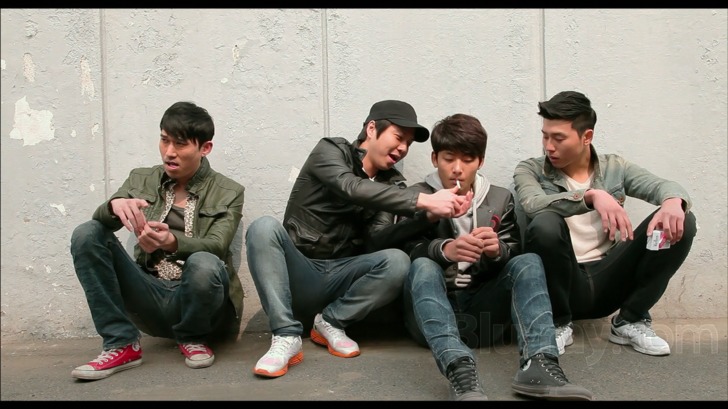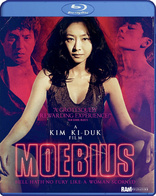Moebius Blu-ray Movie
HomeMoebius Blu-ray Movie 
Film Movement | 2013 | 88 min | Not rated | Oct 28, 2014Movie rating
6.7 | / 10 |
Blu-ray rating
| Users | 0.0 | |
| Reviewer | 3.0 | |
| Overall | 3.0 |
Overview
Moebius (2013)
In this wordless film a wife fails to exact revenge on her cheating husband so instead takes it out on her son by cutting off his penis. Remorseful, the husband tries his best to make it up to his son.
Starring: Cho Jae-hyun, Eun-woo Lee, Young-ju Seo, Kim Jae-Hong, Kim Jae-rokDirector: Kim Ki-duk
| Foreign | Uncertain |
| Surreal | Uncertain |
| Drama | Uncertain |
| Dark humor | Uncertain |
Specifications
Video
Video codec: MPEG-4 AVC
Video resolution: 1080p
Aspect ratio: 1.85:1
Original aspect ratio: 1.85:1
Audio
Korean: LPCM 2.0
Film w/out dialogue
Subtitles
None
Discs
25GB Blu-ray Disc
Single disc (1 BD)
Playback
Region free
Review
Rating summary
| Movie | 2.5 | |
| Video | 4.0 | |
| Audio | 4.0 | |
| Extras | 2.0 | |
| Overall | 3.0 |
Moebius Blu-ray Movie Review
A Continuous Band of Torment
Reviewed by Michael Reuben November 28, 2014Forget Lars von Trier's Nymphomaniac. For kinky sex and tormented family relationships, Korean writer/director Kim Ki-Duk has the Danish auteur beat, and Kim only needs a trim 88-minute running time to slip into the viewer's subconscious like an unclean spirit. Indeed, Kim is far more dangerous than von Trier, because you think you've made a quick escape. Only later do you realize the degree to which Kim's film has left its mark, when its images keep bubbling up to the surface of memory. Von Trier's excess has the advantage of putting you on your guard, whereas Kim slips past your defenses unnoticed, like a guerilla warrior of the imagination. Moebius premiered out of competition at the 2013 Venice Film Festival, where Kim's Pieta had won multiple awards the previous year. The release followed months of contention with South Korea's ratings board, which initially rated the film as "restricted", which would have effectively banned it in the director's native country. After trimming what is reported to be approximately three minutes, Kim was able to receive the lesser rating of "teenagers restricted". As far as I have been able to determine, Kim's original cut has not been released, and no release is planned. In the U.S., Moebius is being issued on DVD and Blu-ray by Film Movement's RAM Releasing.

The essential stylistic device of Moebius is that it has no dialogue. Characters interact through gestures, facial expressions and physical contact, which is often violent. Kim cheats occasionally by having characters read information on the internet, which allows him to convey a few key points requiring words. As a result of this pantomime approach, the characters have no names and we learn little about them other than their basic family roles: Father (Jo Jae-hyun), Mother (Lee Eun-woo) and Son (Seo Young-joo). There is also Father's occasional girlfriend, a Shopgirl (Lee Eun-woo, in a second role), whose sexual involvement with Father is the excuse that sets the plot in motion. The lack of dialogue in Moebius has a distancing effect, at least initially. People do not relate to each other as they would in life. They remain silent even in situations where almost anyone, in any culture, would say something, even if it were just to express pain, anger or surprise. As Moebius continues, however, the effect is to focus the viewer's attention on each character's expressions and actions and to provoke questions about what each character is thinking. We are so used to assuming that what comes out of a person's mouth reflects their inner self that, when deprived of that source, their very silence commands our attention. Although Moebius has sometimes been summarized as the story of a mother who castrates her son as revenge on her husband, that is inaccurate. Crazed with jealousy over Father's indiscretions, Mother first attempts to cut off his penis while he sleeps. (American audiences may be reminded of the infamous case of Lorena and John Bobbitt.) But when Father is awakened by the attempted assault and successfully resists, Mother goes to their sleeping teenage Son and does to him what she failed to do to Father. (She does even more, but I'll leave the additional graphic details for the viewer to discover.) As a dazed Mother disappears into the night, Father carries his injured Son to the emergency room. These horrific events are just the beginning of the film. In the wake of this trauma, Father tries to cope with the guilt of what his actions have cost his Son, while the Son tries to deal with his changed circumstances and the anger and shame that nearly chokes him, especially when boys at school become aware of his condition. Meanwhile, Father undertakes drastic action as a sort of atonement, then begins searching the web for information about penile transplants and alternate forms of sexual gratification. The latter search leads him to sites about using the entire body as an erogenous zone, with photographs that depict specific methods of inflicting wounds that look suspiciously like Christ's stigmata. Still, Father's investigation proves fruitful. Both he and his Son eventually learn to achieve sexual release through the focused application of injury, although each time the release is followed by intense pain, as if their pleasure must always come at a price. Indeed, the pairing of pleasure and pain is a recurring motif throughout Moebius, as is also demonstrated in the Son's disturbing relationship with the Shopgirl, whom he seeks out after his injury. Because of him, she ends up being targeted by a gang of ruffians, but the son eventually shows her a poetically just method of getting even. She, in turn, shows him a new "variation" on the technique he has learned from his Father (and it's not for the squeamish). In the end, one cannot say whether their connection is emotional or strictly utilitarian, but it is one of shared pain, both exchanged and inflicted on others. Although Father eventually succeeds at getting his Son a penile transplant, the newly grafted member is unresponsive. Even the ministrations of the Shopgirl produce no response. Nothing changes for the Son until his Mother abruptly reappears on the family doorstep, with no explanation for her absence or sudden return. Her presence immediately reestablishes the fraught family dynamic that existed at the start of the film and reinforce Kim's point that sex and desire are a continuous line running through family life without beginning or end (the "moebius strip" of the title). While this is hardly a new insight to a Western culture steeped in Freud and psychoanalysis, Kim contends that it is a taboo subject in Korea and one that he is forcing into the light with this film. With the Mother's reappearance, the family explodes into conflict once again, with even more frightful results than before. Kim's resolution to this toxic brew of primal urges, both dramatically and, I suspect, as a prescription for life, is foreshadowed early in the film, just after Mother walks out into the night after injuring her son. As she wanders through deserted city streets, she passes what appears to be a homeless man praying to a statue of Buddha in a store window. By the end of the film, Kim has made it clear that this lowly individual has achieved a state of enlightenment and passivity far superior to anything found in the lives of this miserable family or anyone connected to it. He alone is no longer driven by animal urges that send people careening from one painful encounter to the next.
Moebius Blu-ray Movie, Video Quality 

Specific information about the shooting format of Moebius was unavailable, but it has the same look as Pieta, which was shot digitally on portable DSLR cameras. Director Kim Ki-Duk served as his own cinematographer. After processing on a digital intermediate, the image on RAM Releasing's 1080p, AVC-encoded Blu-ray is sharp, clear and detailed with solid blacks and distinctively natural colors. Only occasional aliasing on horizontal edges betrays the DSLR origination; otherwise, the project could have been shot on a professional camera. Digital origination also allows RAM to get away with a 15.00 Mbps average bitrate, but the compressionist is also helped by many shots where Kim simply holds on a face while thoughts and emotions play across it.
Moebius Blu-ray Movie, Audio Quality 

Moebius' stereo soundtrack is presented as PCM 2.0. The lack of dialogue is complemented by an almost total lack of music, except near the very end. The track is comprised mostly of sound effects, which are used sparingly, accompanied by grunts, cries, howls and other assorted non-verbal noises that the characters make. It's a simple track, capably reproduced in stereo, with most of the sound imaging toward the center.
Moebius Blu-ray Movie, Special Features and Extras 

- Cast and Director Interviews (1080p; 1.78:1; 6:07): A promotional piece created for the Venice Film Festival featuring the three main cast members and director Kim.
- Director Kim Ki-Duk Interview (1080p; 1.78:1; 3:00): A second promotional piece for the Venice Film Festival, this time focusing on director Kim.
- Interview with Actress Lee Eun-Woo (1080p; 1.78:1; 22:24): Question are on intertitles in English; the answers are dubbed. The answers are bland, at least in the translation provided.
- Post-Screening Q&A at NYAFF (1080p; 1.78:1; ): Lee Eun-Woo is the only participant in the Q&A and speaks through an interpreter. Although some interesting information is supplied about the logistics of the shoot, the dialogue is hampered by translation issues, especially when questions are taken from the audience.
- Trailers (1080p)
- Moebius
- APP
- Forgetting the Girl
- Hide and Seek
Moebius Blu-ray Movie, Overall Score and Recommendation 

There is no doubt that Kim Ki-duk is a talented filmmaker, but his penchant for making his films an act of suffering and purgation not just for the characters but also for the viewers—a trait he shares with von Trier—has grown to the point where it seems almost obsessive. The cruelties that family members inflict on each other has been a perennial subject for dramatists, novelists and poets since the time of the Greeks, but most dramatic artists portray such cruelty in manner to which audience members can relate from experience. Few rely on the frequent use of knives, as Kim does in Moebius. Despite the intense effort of the talented cast, one never feels that these are characters so much as constructs, stick figures assembled by the writer/director to act out an allegory about the baseness of humans. Kim's an effective storyteller, but the effect isn't so much enlightening as repellent. Enter at your own risk.
Similar titles
Similar titles you might also like

Omar
2013

Pieta
피에타
2012

Beanpole
Дылда / Dylda
2019

Young & Beautiful
Jeune et jolie / Slipcover in Original Pressing
2013

Secret Sunshine
밀양 / Milyang
2007

The Club
El Club
2015

Damage
1992

Pioneer
Pionér
2013

Torment
L'enfer
1994

Bastards
Les Salauds / Slipcover in Original Pressing
2013

The Salesman
Forushande
2016

The Conformist
Il Conformista | 4K Restoration
1970

Wild Tales
Relatos salvajes
2014

Neon Bull
Boi Neon
2015

Mustang
2015

Julieta
2016

Phoenix
2014

Stray Dogs
郊游 / Jiao you
2013

Through a Glass Darkly
Såsom i en spegel
1961

Beyond the Hills
După dealuri
2012
